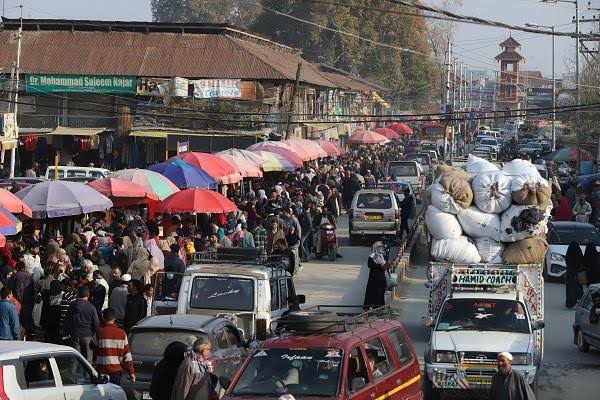
In a recent scoop, a Srinagar newspaper pointed fingers at street vendors for cranking up the volume on Baramulla’s noise pollution dial. Some locals, quoted by the newspaper, promptly tagged the vendors as the usual suspects. While it’s true that street vendors add their unique playlist to the pollution mix, it’s essential to recognize that our society’s noise pollution ensemble already has quite the repertoire.
The bulk of the decibel drama unfolds in the elite circles – where vehicle honks form a symphony that would put a heavy metal concert to shame. Rumor has it; even the staff gets in on the honking action.
The streets resemble a perpetual traffic jam concert, with horns blaring for no apparent reason, other than to assert vehicular dominance. Meanwhile, there’s a musical fountain near Dal Lake that’s practically auditioning for a rock band, but no one’s batting an eye. It’s always the humble street vendors who end up being the punching bags of noise complaints and the mosques are the latest entrants, the kids blowing music on streets are cool.
Welcome to Kashmiri society, where power dynamics are as fluid as a teenager’s mood swings. You’ve got the rich, flexing their influence, and the powerless, catching blame like it’s going out of style. The classes switch roles occasionally, just to keep things interesting.
The market isn’t just about goods; it’s a way of life, a determining factor for relationships, emotions, and even one’s status as a “fully human” being. If you can’t buy it, you might as well be an extraterrestrial, that is exactly the case here, these people on the streets, selling for their livelihood, may not necessarily be the consumers of elite newspapers or the products the endorse, advertise. So, all the blame, let us blame them.
Research dives into the dehumanization of the low-socioeconomic status (SES) groups – portraying them as money-draining welfare enthusiasts., curse for the society and unwanted objects in our towns causing all problems.
This dehumanization isn’t just bad for their self-esteem; it’s also a buzzkill for social welfare policies. The media, with its knack for drama, throws in some negative imagery and language, especially when it comes to crimes and the accused. If you have failed to notice, the profession of the poor accused in a crime always makes a headline, while the profession of the rich hardly finds a mention in headlines of Kashmir’s elite newspapers. It’s like they’re auditioning for the villain role in a blockbuster.
Consumerism is the name of the game, where goods and lifestyles aren’t just functional; they’re social status symbols. The media, particularly the high-and-mighty outlets in Kashmir, play a part in this dehumanization, affecting health, law, and society. It’s like society is stuck in a bad reality show where the poor are voted off the island.
The systematic dehumanization of the poor, who can only afford to window-shop, turns them into society’s invisible underdogs. Neoliberalism, the ideological maestro, orchestrates a symphony where the market reigns supreme, and community and the State are relegated to the cheap seats.
Fast forward to the past five years, where poor street vendors have been on a rollercoaster of “relocation” and “demolition” drives. But society is the silent spectator until the poor are shown begging, crying on social media – it’s like a twisted reality show, but without the glamour.
Abuse of power, bureaucratic discretion, and the never-ending quest to sort the “deserving poor” from the “undeserving” ones keep the poor on their toes. Treating them as mere administrative cases instead of humans only adds insult to injury. It’s almost like society is playing a bizarre game of hide-and-seek with the poor, keeping them vulnerable and just above the survival line.
In this socio-economic circus, the laugh track is missing, and the jokes are getting old. Maybe it’s time we change the script and give the underdogs a chance to shine in the spotlight. After all, a little humor might just be the missing chord in our noisy symphony of societal issues.
Author Profile

Latest entries
 OTHERSApril 16, 2025Govt bans manufacture, sale of 35 fixed-dose combination drugs
OTHERSApril 16, 2025Govt bans manufacture, sale of 35 fixed-dose combination drugs FEATUREDApril 16, 2025A.S. Dulat: The spymaster who’s no stranger to controversy in Kashmir, a list of major ones
FEATUREDApril 16, 2025A.S. Dulat: The spymaster who’s no stranger to controversy in Kashmir, a list of major ones REGIONALApril 16, 2025Man dies of alleged medical negligence at CD hospital
REGIONALApril 16, 2025Man dies of alleged medical negligence at CD hospital WRITE-UPSApril 16, 2025‘Cannot be tied to one religion’: Supreme Court upholds Urdu on signboards
WRITE-UPSApril 16, 2025‘Cannot be tied to one religion’: Supreme Court upholds Urdu on signboards
